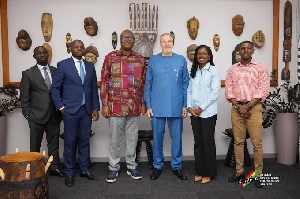- Home - News
- Elections 2024
- News Archive
- Crime & Punishment
- Politics
- Regional
- Editorial
- Health
- Ghanaians Abroad
- Tabloid
- Africa
- Religion
- Photo Archives
- Press Release
General News of Tuesday, 1 April 2025
Source: www.ghanawebbers.com
Early learning Breakthrough: New study reveals a scalable path to delivering quality early learning to every child
A new study from the non-profit SmartStart shows that early learning programs can greatly improve children's outcomes. These programs, run in homes and community venues, help combat educational inequality.
Independent researchers found that the percentage of children "on track" increased by 20 points. It rose from 45% to 65%. Meanwhile, the number of children "falling far behind" nearly halved.
The study revealed a significant reduction in the achievement gap. The gap between low- and high-income households fell from 25 points to just 6 points. This change highlights a strong path for social mobility and educational equity.
Grace Matlhape, CEO of SmartStart, emphasized the importance of empowering women in low-income areas. She noted that these women can effectively deliver early learning programs at home and in communities. The findings suggest an affordable way to provide early education for every child.
Kulula Manona, Chief Director for Foundations for Learning, praised the study's insights. She highlighted how it shows children's potential when given proper developmental opportunities. Community-based early learning programs play a vital role in bridging access gaps.
Researchers tracked the progress of 551 children over eight months using South Africa’s Early Learning Outcomes Measure (ELOM). The SmartStart cohort outperformed national benchmarks for early childhood development. This evidence supports that well-designed community programs can lead to measurable improvements.
Professor Sarah Chapman noted that effectiveness does not rely on expensive infrastructure. Instead, it depends on equipping practitioners with essential tools and support. Simple practices like nurturing care and child-centered play can significantly improve outcomes.
Matlhape pointed out that the SmartStart model leverages community strengths. Programs operate in homes and local venues, providing immediate solutions for excluded children. She urged governments to create supportive policies for these practitioners.
Celebrating its tenth year, SmartStart now has over 13,000 early learning programs serving more than 125,000 children weekly. Its approach is rooted in community empowerment and meeting local needs.
Matlhape celebrated the ordinary women making extraordinary impacts through simple practices daily. These women are powerful agents of change for future generations.
She also acknowledged implementing partners and community support as crucial to their success. Their collective efforts demonstrate how collaboration can overcome socio-economic barriers in early learning.
This study represents the largest ELOM evaluation of a South African early learning intervention so far.
Entertainment










